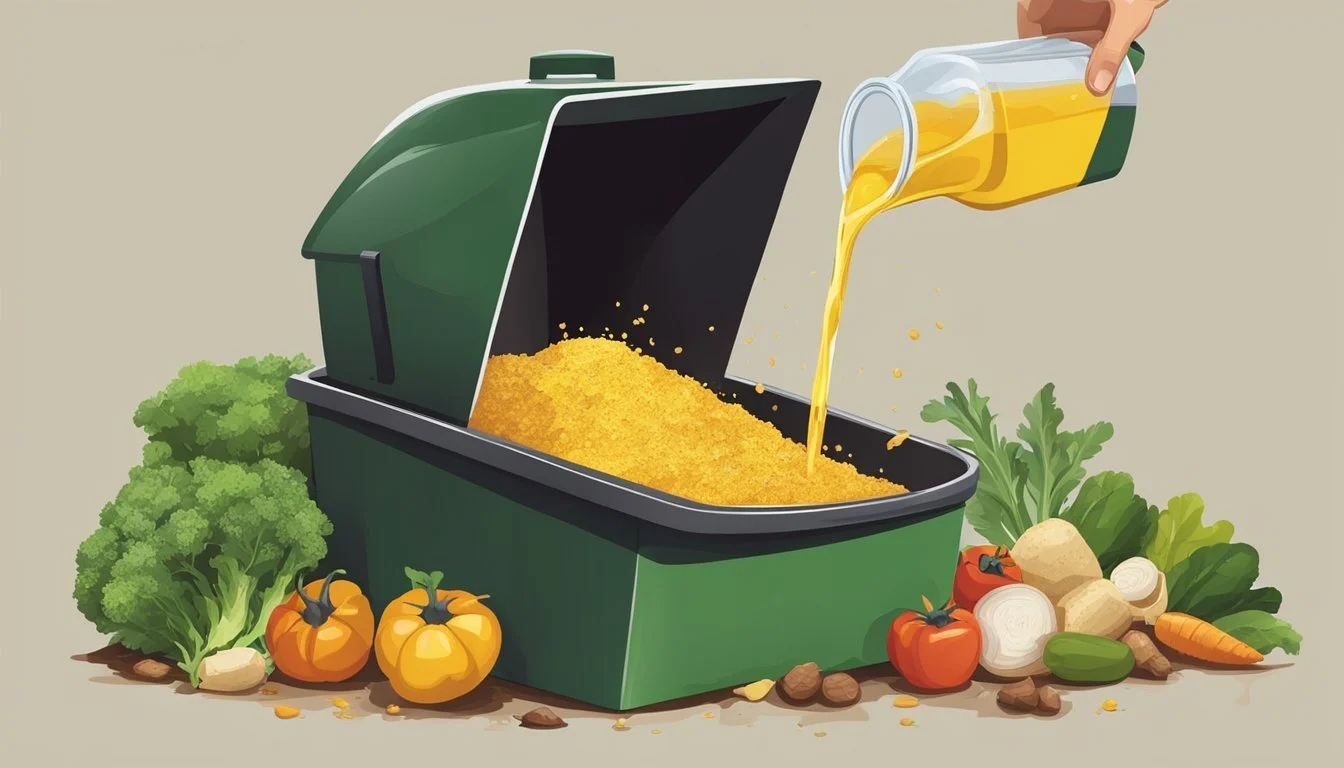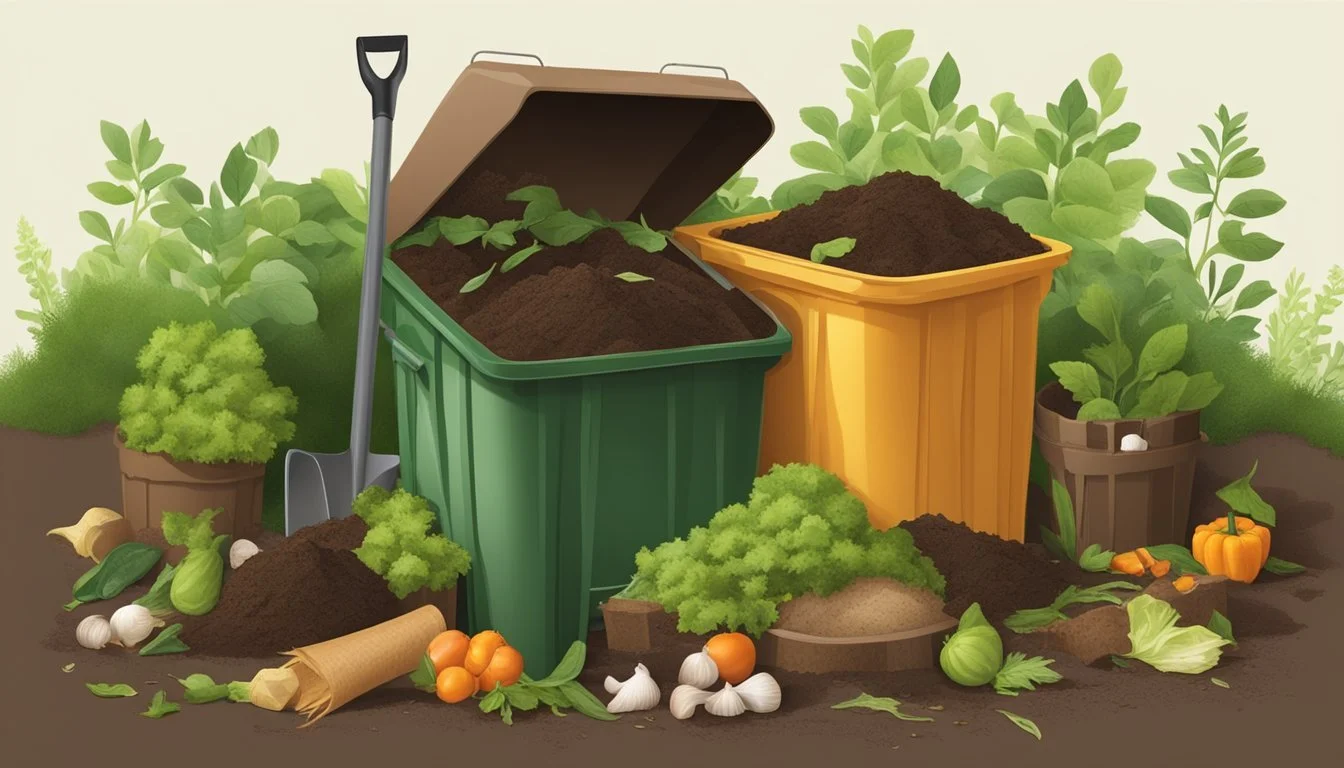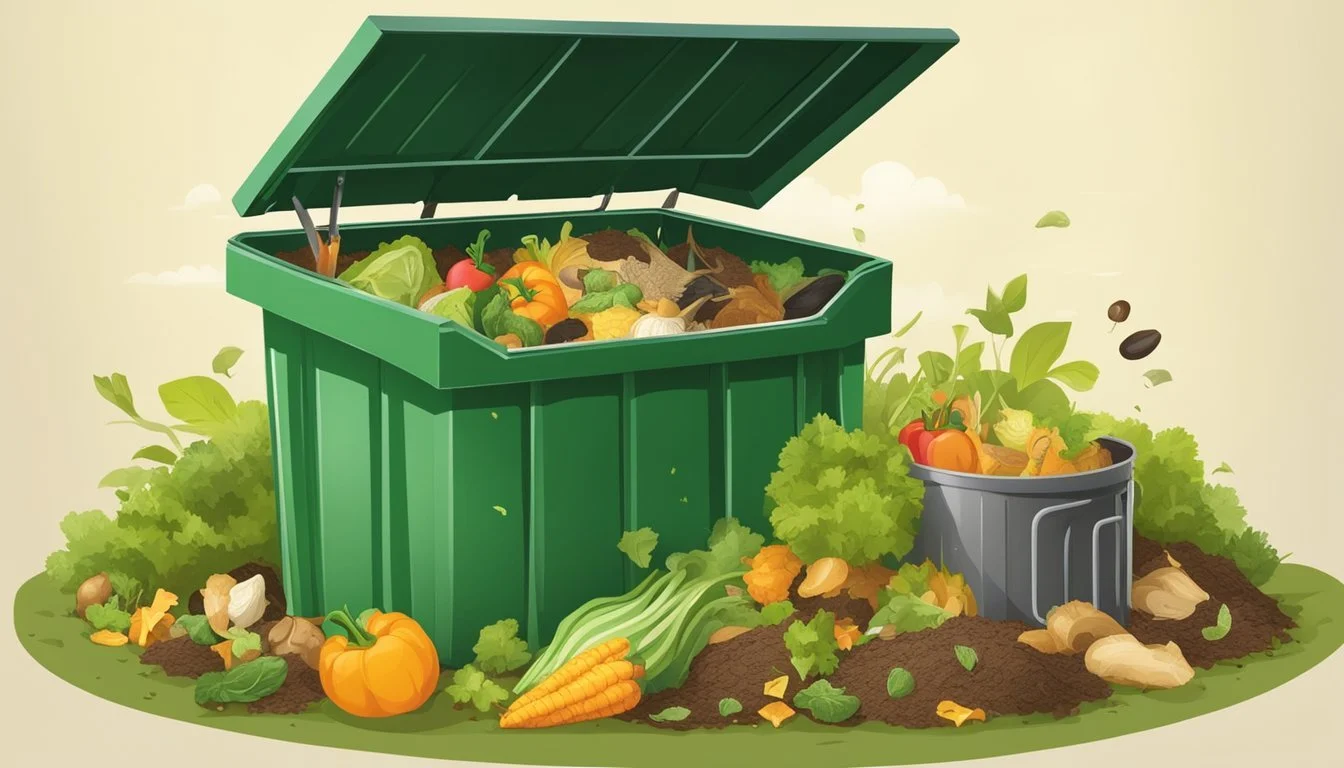Can You Compost Vegetable Oil?
Understanding Its Impact on Composting Systems
Composting is a method of recycling organic waste into nutrient-rich soil amendments, and vegetable oil, as an organic material, can indeed be composted. However, the addition of vegetable oil to a compost heap should be done with caution. While it is biodegradable, vegetable oil needs to be added in small quantities to avoid disrupting the balance of the composting ecosystem. Large amounts of oil can impede air circulation and slow down the decomposition process, potentially leading to unpleasant odors and a less efficient composting system.
To successfully compost vegetable oil, one must ensure that the compost pile is maintained with the right conditions. The compost should have a sufficient amount of heat, ideally between 120 and 150 degrees Fahrenheit, and should be mixed regularly to facilitate aeration and break down the oil effectively. Moreover, it's important to use only plant-based oils that have not been in contact with animal products, as these can attract pests and cause other composting complications.
For those considering composting vegetable oil, it's useful to note that moderation is key. A few oil-soaked paper towels might be acceptable, but it's advisable to consult with a composting service provider, if one is being used, to confirm their guidelines. The ability to compost oil-infused foods similarly relies on the type and amount of oil used as well as correct composting techniques. Understanding these nuances can lead to beneficial composting practices that contribute to a sustainable cycle of organic waste management.
Understanding Composting
Composting is the process of recycling organic material through controlled decay, resulting in nutrient-rich soil. It involves microorganisms, oxygen, and an ideal balance of carbon and nitrogen-rich materials.
Fundamentals of Composting
The success of a compost heap or compost pile hinges on the decomposition process, wherein microorganisms break down organic material. Essential to composting are oxygen, which is supplied by regularly turning the pile, and moisture to support the microbial activity. The right balance fosters a thriving ecosystem, ensuring efficient breakdown and minimizing unwelcome odors or pests.
Benefits and Challenges of Composting Cooking Oil
Composting vegetable oil can add value by contributing fats that some microorganisms use to thrive. However, it is essential to only add small amounts of plant-based oils that haven't been in contact with meat products, as this can attract rodents and other pests.
The challenges include managing the quantity of oil added—excessive amounts create oxygen circulation issues in the compost heap, leading to anaerobic conditions and foul odors. It's also important to maintain a high temperature, generally around 120°F (49°C), to ensure the oil breaks down adequately without harming the decomposition process.
Vegetable Oil in Composting
Integrating vegetable oil into a composting strategy requires an understanding of the types of oils that are suitable for composting, how oils affect the composting process, and the appropriate quantities that can be added without disrupting the composting ecosystem.
Types of Oils and Their Compostability
Plant-Based Oils: Compostable
Olive Oil
Corn Oil
Sunflower Oil
Rapeseed Oil (including Canola Oil)
Coconut Oil
Synthetic Oils: Not Compostable
These oils are derived from non-renewable resources and can contain harmful chemicals that should not be introduced to a compost heap.
The Impact of Oil on Composting Processes
Aerobic Activity: Small amounts of plant-based oils can be broken down by microorganisms in a compost pile under the right conditions.
Air Circulation: Excessive oils can lead to anaerobic conditions, reducing air circulation and creating foul odors.
Temperature: A hot compost pile, with temperatures between 120-150ºF (49-66ºC), is better equipped to handle oils as the heat accelerates microbial activity that can break down fats.
How Much Oil Can You Compost?
General Rule: Only add small amounts of vegetable oil to avoid disrupting the balance of the compost pile.
Measurement Guideline:
For a medium-sized compost pile, integrate no more than 1 cup of vegetable oil per month. Any more can slow down composting.
food scraps cooked with plant-based oils (e.g., used cooking oil) can be added to compost in limited quantities, provided they have not come into contact with meat, cheese, or fish, which introduce non-compostable fats and grease.
Implementing Composting Best Practices
Composting vegetable oil requires careful moderation and a clear understanding of compost ecology to prevent issues such as pests and foul odors. Implementing best practices ensures a nutrient-rich compost while minimizing risks.
Maintaining a Healthy Compost Pile
A healthy compost pile achieves the right balance between greens (nitrogen-rich materials) and browns (carbon-rich materials), as well as maintaining adequate moisture levels and aeration to facilitate the breakdown of organic matter. For a hot compost pile, temperatures between 120-150 degrees F are ideal. This temperature range helps to break down compost materials efficiently and can better handle the addition of a small amount of vegetable oil without disrupting the delicate balance.
Greens: Vegetable scraps, fruit waste, coffee grounds
Browns: Dry leaves, straw, wood chips
Moisture: Should be comparable to a wrung-out sponge
Aeration: Turn the pile regularly to introduce oxygen
PH levels also play a crucial role; they should be neutral to slightly acidic for most composting processes.
Methods to Mitigate Risks
To minimize the risks associated with composting oils:
Add small amounts of vegetable oil to avoid overwhelming the microbes responsible for decomposition.
If oils are added, increase browns to absorb the oils and prevent a barrier that could inhibit air and moisture circulation.
Consider a sealed container composting method if composting oils regularly, to deter pests, rodents, vermin, and flies attracted to oils.
Dos and Don'ts of Composting Oils
Do:
Recycle small amounts of plant-based oils.
Use a compost bin with a secure lid to deter animals.
Monitor the pile for any signs of foul odors or poor aeration.
Don't:
Include oils that have come into contact with meat, as they can attract vermin.
Overwhelm the compost with large quantities of oil.
Forget that some essential nutrients may be compromised by excessive oils.
Careful adherence to these practices will help maintain a robust composting system, ensuring valuable nutrients for the garden without unwanted side effects.
Recycling and Reusing Vegetable Oil
When it comes to used vegetable oil, recycling and reusing it offers an environmentally friendly alternative to disposal. There are specific avenues through which used cooking oil can be repurposed, ranging from creative household uses to contributing to biodiesel production through grease recycling programs.
Alternative Uses for Used Cooking Oil
Household Lubricant: Used cooking oil can serve as a simple lubricant for squeaky hinges and sticky mechanisms.
Creating Products: Artisans may use small quantities of used vegetable oil in the production of soaps and candles.
DIY Projects: Individuals can reuse their used cooking oil in home-made products such as compost accelerators or for rust prevention.
Oil Recycling Facilities and Programs
Grease Recycling Program Participation: Many urban areas offer grease recycling programs where individuals can deposit organic materials like used cooking oil. This helps prevent clogs in the sewage system and promotes recycling.
Biodiesel Production: Recycling facilities often convert used cooking oil into biodiesel, an eco-friendly fuel alternative.
Locating Facilities: A simple internet search typically reveals nearby recycling locations where individuals can bring used vegetable oil for proper handling and reuse.
Note: It's crucial to check with local facilities about their specific guidelines and accepted materials to ensure the proper recycling of used cooking oil.
Preventing Environmental Impact
Composting vegetable oil, when done correctly, can be part of an eco-friendly waste reduction strategy, which plays a crucial role in minimizing pollution and enhancing soil health.
The Role of Composting in Waste Reduction
Composting is a process that turns organic waste into valuable fertilizer, contributing to reducing waste and lessening the carbon footprint. Vegetable oil, in moderate amounts, can be incorporated into compost piles as it is a compostable material. This helps divert organic waste from landfills where it would otherwise contribute to greenhouse gas emissions. By including vegetable oil in compost, one can support a more eco-friendly practice and assist in controlling the negative environmental impact commonly associated with organic waste disposal.
Benefits of Composting Vegetable Oil:
Provides nutrients to compost
Helps in reducing landfill waste
Cuts down the use of chemical fertilizers
Impact on Soil Health and Pollution
Incorporating vegetable oil into compost must be done with care to prevent soil contamination and pollution. Small amounts of plant-based oils enrich the compost with nutrients, enhancing the fertility of the soil without the need for chemical fertilizers. However, excessive oil can lead to issues such as impaired air circulation and attract pests, which potentially counters the positive effects of composting.
Key Considerations for Soil Health:
Only add small amounts of plant-based oils to compost
Avoid composting oils that have been in contact with meats or dairy products to prevent contamination
By ensuring that only appropriate quantities of vegetable oil enter the composting system, one can promote an eco-friendly recycling of organic material while also maintaining the integrity of the soil and protecting against pollution.
Advanced Techniques
The advanced techniques in composting vegetable oil involve two distinct methods aimed at experienced composters: vermicomposting and high-temperature composting. Both require a more nuanced understanding of compost principles and monitoring but can yield excellent results when done properly.
Composting with Worms
Vermicomposting, or worm composting, uses the natural decomposition abilities of worms to break down organic waste, including small quantities of vegetable oil. For oils:
Worm Bin: A well-maintained worm bin with adequate carbon-rich materials, like shredded paper or dry leaves, helps absorb excess moisture from oils.
Oils Amount: Only very slight amounts of plant-based vegetable oils should be introduced to prevent harm to the worms and avoid issues with odor or pests.
High-Temperature Composting
High-temperature composting, or hot composting, accelerates the breakdown process through thermal activity. In this method:
Temperature Control: Maintaining temperatures between 135°F and 160°F is crucial for effectively composting oils while killing pathogens.
Air Circulation: Ensure the compost heap is turned regularly to maintain oxygen levels and disperse heat, aiding in the breakdown of oils.
Yard Waste: A balanced mix of yard waste, kitchen scraps, and other compostable materials alongside the oils encourages a diverse microbial population for thermal decomposition.
Both techniques allow for the composting of vegetable oil when handled with care, ensuring the compost heap remains healthy and productive.
Addressing Common Concerns
When integrating vegetable oil into a composting strategy, it is vital to consider how it affects the compost ecosystem, encompassing potential odor issues and the attraction of unwanted pests. This section explores common concerns tied to composting oil, notably pest attraction, odor management, and frequently asked questions for clarity and successful composting.
Pests and Rodent Attraction
It is recognized that decomposing oils can emit scents that attract pests and rodents to the compost bin. To mitigate this:
Prevention: Limit the amount of vegetable oil added to the compost. Small quantities, like oil-soaked paper towels, are generally acceptable.
Maintenance: Regularly turn the compost to distribute oils and maintain a balanced environment.
Dealing with Odors and Spills
Managing foul odors and spills is crucial for maintaining a healthy compost process:
Absorption: Add brown materials like dry leaves or sawdust to absorb excess oils.
Aeration: Ensure the compost is well aired to disperse odors and expedite the decomposition of oil.
Frequently Asked Questions
Q: Can I compost leftover sauces or gravy? A: Composting small amounts is possible, but one must avoid sauces with meat or dairy to not attract pests.
Q: How should I handle bacon grease or canned fish oil in compost? A: It's best to avoid composting these fats as they can create foul odors and attract pests more aggressively than vegetable-based oils.
Q: What is the best practice for cleaning up spills in or around the compost bin? A: Spills should be cleaned promptly, using appropriate organic material to absorb the oil and incorporate it back into the compost if possible.
Related Environmental Practices
Incorporating composting of vegetable oil into daily routines speaks to a broader commitment to environmental stewardship. The practices below align with reducing waste and promoting sustainability.
Reducing Household Food Waste
Households can decrease their environmental impact by composting organic waste, such as food scraps and certain types of oils. Composting serves as a natural recycling process where beneficial bacteria break down organic material, turning waste into nutrient-rich soil. Vegetable oils should be added in limited quantities to ensure they do not upset the balance of the compost pile. Excessive oils can hinder composting by suffocating beneficial microbes and creating an anaerobic environment.
When composting:
Add vegetable oil sparingly: no more than one cup per cubic yard of compost material.
Balance with dry, carbon-rich materials: such as leaves or straw, to maintain proper air flow.
Sustainable Cooking and Kitchen Tips
Sustainable kitchen practices extend beyond composting to include the way households manage cooking oils and other kitchen waste. Reusing and recycling should be a priority. For example, used cooking oils can be collected and repurposed for other cooking needs, or in some cases, used to make biodiesel.
When managing kitchen waste:
Reuse when possible: for instance, drain and save cooking oils for future use.
Recycle correctly: contact local waste management services to find out how to properly recycle oils that cannot be composted.
Paper towels soaked with vegetable oils should be disposed of in the trash, not recycled, as they can contaminate other recyclable materials. Encouraging the right disposal of such items mitigates the potential negative impact on the environment and supports the efficiency of recycling operations.
Final Thoughts
Incorporating vegetable oil into a compost pile requires careful consideration to maintain the integrity of the finished compost quality. The right balance and conditions are imperative for successful integration into a garden ecosystem.
Achieving Finished Compost Quality
To ensure the quality of finished compost when vegetable oil is involved, one needs to regulate both the amount of oil added and the composting conditions meticulously. For a healthy compost pile and effective gardening outcomes, consider the following factors:
Temperature: The compost should reach at least 120°F (49°C) to facilitate the breakdown of vegetable oil and ensure destruction of potential pathogens.
Quantity: It is crucial to add only small amounts of vegetable oil to avoid disrupting the compost's balance.
Aeration: Regular turning of the compost pile ensures proper air circulation, which is vital for decomposing added substances like vegetable oil.
Moisture Level: The compost pile should not be too wet or too dry; moisture levels should be monitored to maintain an optimal decomposition environment.
By adhering to these parameters, one can achieve high-quality finished compost, suitable for enhancing garden soil.






